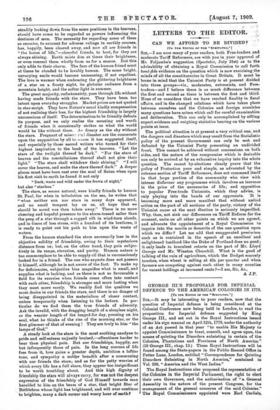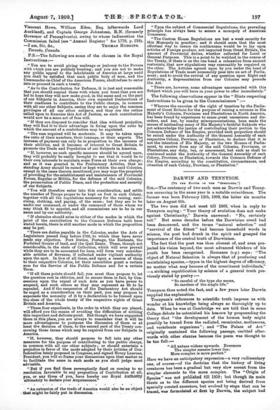GEORGE III.'S PROPOSALS FOR IMPERIAL DEFENCE TO THE AMERICAN COLONIES
IN 1778.
[TO THE EDITOR OF THE "SPECTATOR." j SIR,—It may be interesting to your readers, now that the question of Imperial defence is being considered at the Colonial Conference now being held in London, to read the proposition for Imperial defence suggested by King George III., and set out in the Royal Instructions issued under his sign manual on April 12th, 1778, under the authority of an Act passed in that year "to enable His Majesty to appoint Commissioners to treat, consult, and agree upon, the means of quieting the Disorders subsisting in certain of the Colonies, Plantations and Provinces of North America." (18 George III., chap. 13.) These Royal Instructions will be found among the State-papers in the Public Record Office in Fetter Lane, London, entitled " Correspondence for Quieting Disorders Subsisting in North America," contained in Vol. 299, "America and the West Indies."
The Royal Instructions also proposed the representation of the.Colonies in the Imperial Parliament, the right to elect their own Governors, and the authorisation of " a General Assembly in the nature of the present Congress, for the management of the general concerns of the said Colonies." The Royal Commissioners appointed were Earl Carlisle,
Viscount Howe, William Eden, Esq. (afterwards Lord Auckland), and Captain George Johnstone, R.N. (formerly Governor of Pennsylvania), owing to whose indiscretion the Commission failed (see "Annual Register" for 1778, p. 218).
—I am, Sir, &c., THOMAS HOD:UN& Toronto, Canada.
P.S.—The following are some of the clauses in the Royal Instructions You are to avoid giving umbrage or jealousy to the Powers -with which you are publicly treating; and you are not to snake any public appeal to the inhabitants of America at large until you shall be satisfied that such public body of men, and the Commander-in-Chief of the American Forces, shall refuse to enter into or proceed in such a treaty.
"As to the Contribution for Defence, it is just and reasonable that you should remind those with whom you treat that you are led to hope they will now make good, in the name and on the part of our Subjects in America, their own repeated Declarations of their readiness to contribute to the Public charge, in common with all our other Subjects, seeing they are to enjoy the common privileges of all our other subjects, and they are the rather called upon to Exercise this Act of Justice, as such contribution would now be a mere act of free will.
"If they are disposed to consider that idea 'without prejudice, they will find it to their advantage in fixing upon the ratio by which the amount of a contribution may be regulated.
" The sum required will be moderate. It may be taken upon the ratio of their numbers, their tonnage, or their exports. The increase of payment can only be in proportion to the increase of their abilities, and it becomes of interest to Great Britain to promote the Trade and Population of our Subjects in America.
" If, however, no such specific measure should be agreed upon, they will probably be easily brought to see that it would be to their own interests to maintain some Force at their own charge ; and as it was granted in the Preliminary Articles, that no standing Army should be raised or kept within the said Colonies, except in the cases therein mentioned, you may urge the propriety of providing for the establishment and maintenance of Provincial Forces, Regular or Militia, for the defence of the said Colonies, the preservation of Public Peace, and the protection and security of our Subjects.
"You will therefore enter into this consideration, and settle the number of Troops proper to be kept on foot in each Colony, together with all the regulations necessary for the raising, exer- cising, clothing, and paying, of the same ; but they are to be under our command, or under the command of those whom we may think fit to appoint, and all commissions are to be in our name and by our authority.
"If obstacles should arise to either of the modes in which the point of the contribution to the Common Defence hath been stated herein, there is still another mode in which the proposition may be put.
"There are duties payable in the Colonies, under the Acts of Legislature passed long before 1763, to which they have never made any objection. Port Duties, Postage, the Escheats, the Forfeited Grants of land, and the Quit Rents. These, though not considerable, in the state of Collection, which will ever prevail while they are to be accounted for here, will form very consider- able articles of Revenue, if collected under vigilant authority upon the spot. In lieu of all these, and upon a cession of them to their respective Colonies, let their assemblies grant a certain sum for the Service of the Public Defence and for a certain Term.
"If all these points should fail, you must then propose to let the question rest in oblivion, and to secure them in fact, by Con- cessions upon the repeal of such Acts as you have power to suspend, and such others as they may represent as fit to be repealed. And if the suspension of the Declaratory Act should be urged as a consideration on their part, you may propose to supersede the necessity of it by a declaration to be framed upon the close of the whole treaty of the respective rights of Great Britain and America.
"These four expedients, in the order in which they are placed, will afford you the means of avoiding the difficulties of settling this important and delicate point. But though we have suggested them in this place, you are always to remember that it will be more advantageous to postpone the discussion of them or at least the decision of them, to the second part of the Treaty con- cerning those terms which may be required from our Subjects in America.
"If, however, they should propose to fall into any other measures for the purpose of contributing to the public charge, in common with all our other subjects ; or should entertain a prejudice in favor of the mode adopted by their Articles of Con- federation lately proposed in Congress, and signed Henry Laurens, President, you will so frame your discussions upon that matter as to facilitate the same in such mode as you shall judge most advisable.
" But if you find them peremptorily fixed on coming to no resolution favorable to any proposition of Contribution at all, you, or any three of you, have hereby our Royal Authority ultimately to declare your Acquiescence."
•
"An extension of the trade of America would also be an object that might be fairly put in discussion.
" Upon the subject of Commercial Regulations, the prevailing principle has always been to secure a monopoly of American Commerce.
"The Custom House Regulations are but a weak security for this Monopoly in practice ; and it should seem that the most effectual way to insure its continuance would be to lay upon articles of Foreign produce, not imported from Great Britain, the amount of Provincial duties, whether collected for Local or General Purposes. This is a point to be watched in the course of the Treaty, if there is on the one hand a relaxation from ancient restraints, that new stipulations may reasonably be required on the other. The Articles agreed upon by you under the head of Regulations of Trade must necessarily pass into an act of Parlia- ment ; and to avoid the revival of any question upon Right and Authority, a Representation from our Colonies may precede the Act.
"There are, however, some advantages unconnected with this Subject which you will have in your power to offer immediately."
The following observations appear in the "Hints respecting Instructions to be given to the Commissioners" :- " Whereas the exercise of the right of taxation by. the Parlia- ment of Great Britain for the purpose of raising a revenue in His Majesty's Colonies, Provinces and Plantations in North America, has been found by experience to cause great uneasiness and dis- orders, and has, by sundry misrepresentations, been made the means of misleading many of His Majesty's faithful Subjects who yet acknowledge the justice of contributing their portion to the Common Defence of the Empire, provided such proportion should be raised under the Authority of the General Assembly of each respective Colony, Province, or Plantation, to declare that it is not the intention of His Majesty, or the two Houses of Parlia- ment, to receive from any of the said Colonies, Provinces, or Plantations, any duty, tax, or assessment, but such as shall bo continued under the Authority of the General Assembly of each Colony, Province, or Plantation, towards the Common Defence of the Empire, according to the constitution, circumstances, and situation of such Colony, Province, or Plantation."







































 Previous page
Previous page